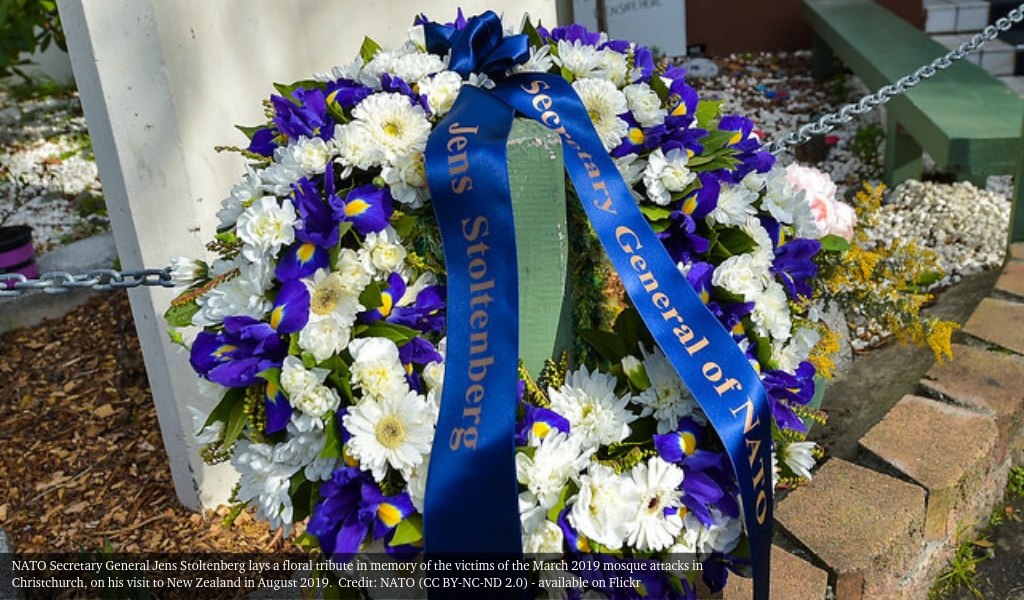Earlier this year, the UN designated 22 August as International Day Commemorating the Victims of Acts of Violence Based on Religion or Belief. Tragically, violence, discrimination and hate speech targeting people on the basis of religion or belief is on the rise and has had horrifying consequences of genocidal proportions in countries like Burma/Myanmar and Iraq. The recently formed Coalition for Religious Equality and Inclusive Development (CREID), led by IDS and funded by UK aid, will be generating evidence and implementing programmes aimed at tackling many of the challenges surrounding religious inequalities at the grass-roots level.

NATO Secretary General Jens Stoltenberg’s floral tribute in memory of the victims of the March 2019 Christchurch mosque attacks, laid during his visit to New Zealand in August 2019. Credit: NATO (CC BY-NC-ND 2.0)
Headlines featuring attacks on churches, mosques and synagogues or refugees fleeing persecution are hard to avoid. What receives less attention is the daily and continuous discrimination experienced by people because of their faith or beliefs – affecting their access to jobs, education or health services, their ability to trade or travel as well as worship, and the safety of their families. In a recent report, CREID partner CSW described these many daily acts of discrimination and hate in the case of Burma/Myanmar. They are present, to difference degrees, in Egypt, Iraq, Nigeria and Pakistan (the focus of CREID’s work) but also in France, Norway, the UK or the USA. A recent report from the Pew Research Center covering trends from 2007-2017 found that religious restrictions based on acts of government and social hostilities are on the rise, while sectarian conflict is on the decline.
Professor Mariz Tadros, Director of CREID, said, “We need move beyond initiatives that focus on interfaith dialogue between religious leaders to address the problems on the ground. Those of us in the development community – working on the frontlines with people living in poverty, marginalisation and exclusion – can play an important role and have a responsibility to tackle some of these issues head on. Religious inequalities overlap with many multiple and often intersecting factors which sustain extreme poverty, including climate, economics, geo-strategic politics and proxy wars.”
In her blog, published today, Professor Tadros proposes Six reasons why we need to move beyond interfaith dialogue if we are serious about redress for victims of violence based on religion or belief.
Forum on Freedom of Religion or Belief and Inclusive Development
Earlier this year, CREID held the inaugural Forum on Freedom of Religion or Belief and Inclusive Development, which brought together people from across faiths and sectors to discuss five key areas which CREID proposes to work on:
- Building up the evidence: to get a better sense of the scale of discrimination and violence, we need better data – but data collection and disaggregation on religion and belief is fraught with ethical and security concerns and could put vulnerable people at risk
- Monitoring and tackling online hate: at a time when even Facebook is struggling to counter hate speech on its platform, focusing on consumption of content, such as helping people to identify fake news, could be a more effective way of tackling the spread of online hate
- Coalition building across social justice movements: finding the common ground between social justice movements will be key to achieving religious inclusivity
- Interfaith service delivery: reducing the appeal of extremism by tackling poverty is important but psychological and emotional factors such as fear, anger, trauma, and the desire for revenge in contexts where people have experienced significant discrimination and violence, make reconciliation, rehabilitation and justice as important a consideration.
- Cross-fertilisation: there is a tremendous wealth of experience in the humanitarian, development and human rights sectors, but these are rarely interconnecting spaces and more needs to be done to learn from each other across these sectors.
Available to watch again: videos of the speeches, panel discussions and interviews from the Forum on Freedom of Religion or Belief and Inclusive Development
- Keynote speeches (in order of appearance):
Mariz Tadros, IDS; Jan Figel, EU Special Envoy on FoRB; Melissa Leach, IDS; Michael Woolcock, World Bank and Mike Battcock, DFID. - Panel discussion on data disaggregation:
Chaired by Rebecca Shah, Religious Freedom Institute (RFI); featuring Katherine Marshall, Georgetown University and World Faiths Development Dialogue; Simon Russell, UNHRC; Timothy Shah, RFI
We did not take videos of the other panels, as some of our speakers and participants, who work in difficult and uncertain contexts, have requested that we do not share these online.
Special thanks to (in order of appearance) Rebecca Shah, Religious Freedom Institute; Dr Dawood Hamzah, Reverend Bonnie Evans-Hill UK Coalition , UN Office for Genocide Prevention; Katherine Thane, Advisor to the UN Special Rapporteur on FoRB, Kit Dorey, Bond; and Mahmood Rafiq, Ahmadiyya Muslim Community for their participation in the following interviews:
- Time to address the yawning gap between development and FoRB
- Understanding the relationship between poverty, marginalisation and extremism
- Collecting data around people’s faith and religious affiliation
- Listening to each other’s experiences across sectors and communities
